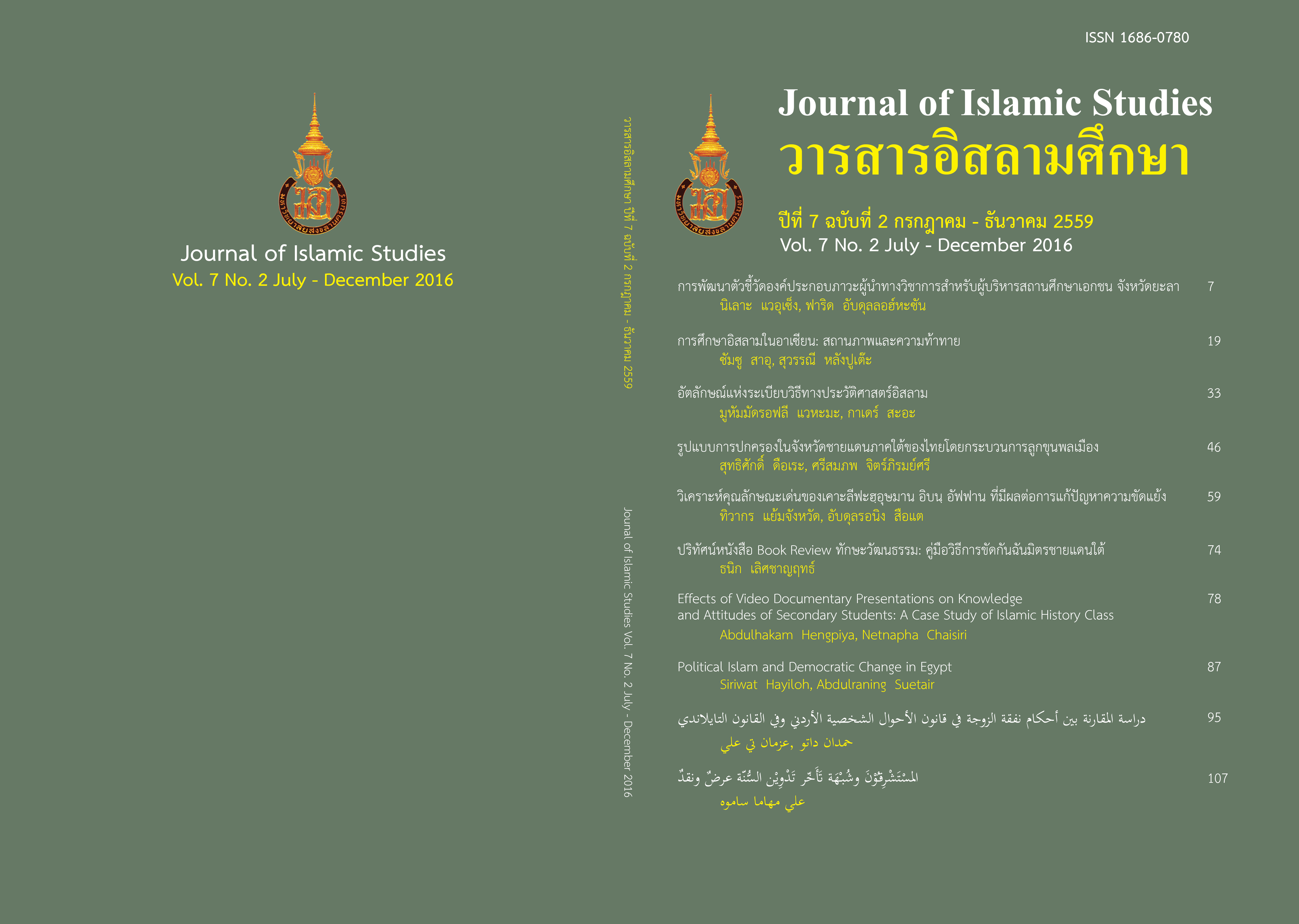Islamic Education in ASEAN : Status and Challenges
Keywords:
Islamic Education, ASEAN, Status, ChallengesAbstract
Muslim in the ASEAN region are diverse and have different identities which have caused differences in Islamic educational management due to their context and condition in each country. This article paper aims to present the status of Islamic Education survival group that has been struggling due to their challenging conditions which can be found in the Myanmar, Laos and Vietnam; 2.Islamic education for human recourses development and identities preservation group which are legally allowed by the governments to conduct Islamic education which has been supported and funded by foreign Muslim countries. Islamic education in this group has benn developed by adopting curriculum models in various sources from different countries to improve learner' academic achievements and preserves their ethnic identities. This group includes Thailand, the Philippines and Cambodia; and 3.Islamic education for comprehensive excellence group which comprises Malaysia, Indonesia, Brunai Darussalam and Singapore. The educational system in these countries are recognized as the best practice of the Islamic educational system, this system can be used as a curriculum and instruction model topromote Islamic education in the group 1 and 2. The most significant challenge towords Islamic education management for educators is to establish the ASEAN Islamic Education Curriculum.
References
ซัมซู สาอุ และวรชัย ปานนิตยพงศ์. (2557). การจัดอิสลามศึกษาในระดับอุดมศึกษา : กรณีศึกษาเปรียบเทียบประเทศมาเลเซียและตุรกี (Islamic education management in tertiary education : comparative studies of Malaysia and Turkey). บทความนำเสนอในการประชุมวิชาการระดับชาติด้านอิสลามศึกษาและมุสลิมศึกษา ครั้งที่ 2 วันที่ 27 ธันวาคม 2557 ณ วิทยาลัยอิสลามศึกษา มหาวิยาลัยสงขลานครินทร์ วิทยาเขตปัตตานี.
สุวรรณี หลังปูเต๊ะ สุกรี หลังปูเต๊ะ สุรชัย ไวยวรรณจิตร ซัมซู สาอุ มูฮัมหมัดอิลยาส หญ้าปรัง กริยา หลังปูเต๊ะ ธีรวัช จาปรัง ฮัมดัน ดารามะ และ มูฮำหมัดราฟีร์ มะเก็ง. (2558). รายงานการวิจัยเรื่อง อิสลามศึกษาในกลุ่มประเทศเอเชียตะวันออกเฉียงใต้. สำนักงานคณะกรรมการอุดมศึกษา.
Abd Rahid, Adnan. (2010). The challenges of Islamic education in Southeast Asia : impacts and prospects. Paper presented at The International Conference on Roles of Islamic Studies in Globalized Society in December 21-23, 2010 organized by College of Islamic Studies, Prince of Songkla University, Pattani, Thailand.
Haji Alias,M., Zulkefli, Zurina Keffeli, & Ahmad, Nursilah. (2007). Employability of Islamic Studies Graduates in Malaysia. Negeri Sembilan : Universiti Sains Islam Malaysia (USIM).
Kaba, Brahima D. & Kaba, Abdulai. (2010). The contribution of Islamic education in non-Arabic speaking social environments. Paper presented at The International Conference on Roles of Islamic Studies in Globalized Society in December 21-23, 2010 organized by College of Islamic Studies, Prince of Songkla University, Pattani, Thailand.
Promadi. (2010). Integrasi ict dalam pendidekan Islam suatu alternatif pendekatan pembelajalan masa depan, MIQOT: Jusnal Ilmu-ilmu Keislaman, 34 (2), 264-284
Downloads
Published
How to Cite
Issue
Section
License
All articles Published in The Journal of Islamic Studies are author’s opinions, and not the responsibility of the Faculty of Islamic Sciences nor the editorial board. However any citation should be referred to the journal.


